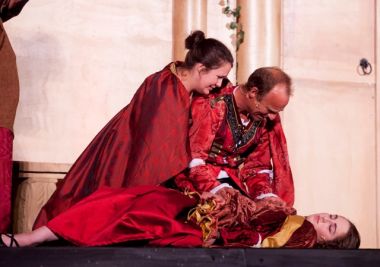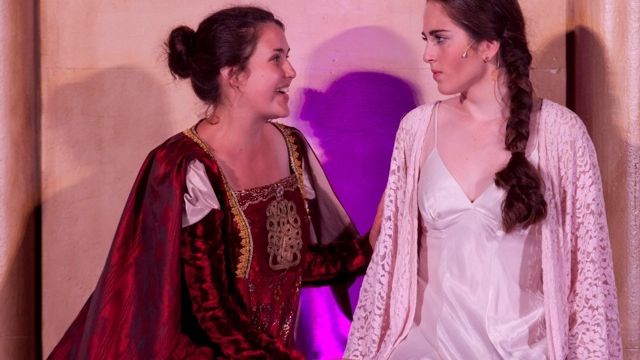Romeo and Juliet, Possums and Picnics.
Shakespeare’s great romantic tragedy Romeo and Juliet is being played out nightly at Melbourne’s Royal Botanic Gardens, where the star-crossed lovers regularly share their picturesque setting with furry guest artists and other festive distractions.
Claire Nicholls, playing Juliet’s mother, Lady Capulet, speaks to Neil Litchfield about the joys and challenges of playing the Bard under the stars.
Neil Litchfield: What is special about the Royal Botanical Gardens as a setting for Romeo and Juliet?
Claire Nicholls: The place where we’re performing this year is the Victoria Lawn, near the Shrine of Remembrance. What’s really beautiful about it is that the stage is set in front of three rather large Casuarina trees. It elevates the set somehow and we’ve got the moon behind it, so it’s a rather picturesque setting for the play.
Probably the most interesting thing I’ve found with it is the possums that come around during the performance, which you have to work around. Sometimes they actually come onto the stage, or cross your path when you’re trying to enter. That’s quite interesting. There’s a lot of fruit bats as well that strike up quite a chorus.
NL: How do you deal with that sort of thing?
CN: It’s all part of the reality. You have to go with the flow. I heard a story from one of the cast members of a previous show that a fruit bat actually crash-landed onto the stage, attached to a big branch which it couldn’t get rid of. They had to remove this branch, then the bat flew off to its freedom over the heads of the audience.
The possums are extraordinarily tame. I don’t think they’re quite used to it and they almost seem to quite enjoy the event.
Outdoor Theatre is always with you or against you. We haven’t been rained out yet, but there have been a couple of quite windy nights. Using microphones in this type of performance can be a bit of an issue. You tend to hear the wind on the microphones. But they’re also a blessing. It’s very nice for a change in outdoor theatre, because without them you have to use a lot of projection and it’s hard to get subtleties in your vocal work.
 NL: Yes, I was going to ask about the various challenges and joys of performing outdoors.
NL: Yes, I was going to ask about the various challenges and joys of performing outdoors.
CN: The last show I did outdoors for the Australian Shakespeare Company was Lady Chatterley’s Lover and for obvious reasons we couldn’t be miked for that – there was a lot of nudity. There were intimate moments which you somehow had to project, yet still maintain the quality of intimacy in the voice, and in your own meaning-making, which is quite challenging.
It’s really lovely (using microphones). Everybody is starting to find the vast range they can use. You can have a lot of quieter moments, which is quite beautiful. I love performing outside because it’s extraordinarily real and it’s just great for your imagination to engage with the night, especially for Romeo and Juliet in this production, when they’re doing their balcony scene and they’ve got the stars and the moon and the treetops all around them.
And for Shakespeare, it seems very authentic and quite close to how it would have been back in the days of the Globe.
Outdoors you have to be a lot more spontaneous than indoor theatre. You’re not quite sure what is going to be put into the space and the audience are having picnics and alcohol, and getting up to buy things during the show. It’s a much more open space – for example, the other night we had Carols by Candlelight next door, which was a bit distracting, and you have people on the street passing by or carousing with their friends, and traffic, and the different bird noises, and how windy it is. There’s a lot more variables, so in a lot of ways you have to be even more centred and grounded performing outside, and a lot more on and alert so you can cope with these new things unfolding.
NL: And when the weather intervenes?
CN: There’s a great camaraderie. It’s fantastic if you do get rained out, or the rain starts to come and it’s just gradually becoming heavier, and you ask the audience whether they want you to keep going, and they do, and you’re all kind of one together in the elements.
 NL: What sort of rain experiences have you had performing outdoors?
NL: What sort of rain experiences have you had performing outdoors?
CN: Last summer was extraordinarily wet and cold in Melbourne when I was doing Lady Chatterley and there were a couple of performances where we got completely rained out. The worst one was when it really started to come down heavily just toward the end and the decision was made to cut a huge section of the play and jump to the end. That’s really hard; when you’re going on the journey and then all of a sudden it’s just severed and you just have to go home. You feel really unfulfilled.
There are times when the audience just wants you to keep going, and they get out their umbrellas and raincoats. That’s just a great feeling – and everything’s sodden – it’s funny – we’ve got these paper props like letters, and everything’s wet, and it’s all breaking apart but it’s really fun.
NL: I suppose that could have been even worse in a play with nudity, like Lady Chatterley.
CN: It could teem rain in that production, though it probably wouldn’t have mattered too much if it came at that point – it just gets a bit cold with the wind blowing on you.
That’s another interesting thing – the shifting temperatures you can get. Last Thursday it was over 40 degrees, and that was extreme - wearing a velvet dress and all those different layers of clothing that the boys have on as well. Then last night was quite cold. It’s interesting how the varying temperatures affect the performance – you can get a really different show.
NL: What sort differences?
CN: Last Thursday everyone got a bit addled because it was so hot and so early in the season. A few entrances got forgotten or people left before they were supposed to or forgot props. That’s the negative side, but the positive when it’s very hot is that you get a slightly more relaxed performance, which can be really good, and brings that dynamic to the audience too – everyone’s a bit more laid back.
When it’s cold you can kind of tighten up more, and perhaps get injured.
 NL: We’ve talked a lot about performing outdoors in general. Tell me a little about your take on Lady Capulet.
NL: We’ve talked a lot about performing outdoors in general. Tell me a little about your take on Lady Capulet.
CN: In the text she has a line to Juliet which is “By my count, I was your mother much upon these years that you are now a maid”, when she’s breaking the news to her that Paris is coming to court her to become his wife. Juliet is 13, about to become 14, so that would make Lady Capulet no older than 28, and because I’m 28, I’m playing that as my real age and that’s my main focus - that she was a young mother and had Juliet at about 12 or 13 years old. She herself was married to a much older man at an early age and she’s been quite estranged from her daughter, being a child herself when she became a mother. That’s quite sad; that she’s quite distanced from Juliet and has quite an awkward relationship with her. Of course Juliet is much closer to her nurse. So there’s almost a kind of a jealousy of Juliet because of her own lost youth and history repeating itself gives you a lot of interesting things to play. There’s a tension between wanting to marry Juliet off, because this is what is done in this time and place, but also remembering that maybe it wasn’t the best thing for herself when she was married at such a young age. So that’s something I’m exploring.
She’s also pretty fantastic because she gets this wide range of emotions. She has absolute fury over Tybalt’s death, and then she has quite cold reserved times, then when she believes Juliet has died she becomes very emotional and distraught, so there’s a lot to play and it’s quite fun really. She’s quite a fiery character.
NL: Any other impressions you’d like to share?
CN: It’s a really dynamic production. The amount of effort and energy the young boys have put into the swordplay alone is worth seeing. The fight scenes are dynamic. It’s a really fast-paced show and a lot of fun to work on, and, I think, to watch as well.
Season: 20 December 2012 ‐9 March 2013
Location: Royal Botanic Gardens Melbourne
Enter through the Observatory Gate on Birdwood Avenue directly adjacent to the Shrine Of Remembrance
Times: From Dec 20 2012 – 2 February 2013
Tuesday – Sunday 8.30PM
From February 5 – 9 March 2013
Bookings: 03 8676 7511 or online at www.shakespeareaustralia.com.au or Ticketmaster 136 100
Subscribe to our E-Newsletter, buy our latest print edition or find a Performing Arts book at Book Nook.

